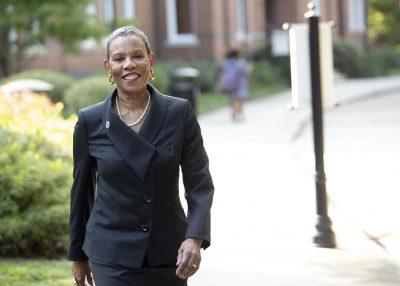
Caption
Spelman President Mary Schmidt Campbell with advisement from a 50-person Task Force on the Path Forward has announced the school’s plans to reopen with a “low-density, hybrid” model for Spring 2021.
Credit: Spelman College

Spelman President Mary Schmidt Campbell with advisement from a 50-person Task Force on the Path Forward has announced the school’s plans to reopen with a “low-density, hybrid” model for Spring 2021.
Spelman College President Mary Schmidt Campbell and a 50-person Spelman College Task Force on the Path Forward, have announced the school’s intentions for a low density, hybrid model when classes are scheduled to resume on Monday, Feb. 1, 2021. Further, Spelman is prepared to adjust their mode of operation, including continuing with fully remote learning, should the pandemic not improve based on data from public health organizations.
Spelman’s Task Force has determined that the historically black college for women can support 350 students in the residence halls. First-year students, seniors, and some student leaders will be given first priority for residing on campus. The Division of Student Affairs is developing an application to reside on campus and a process for selection. The balance of students will continue to learn remotely. To support the students living in the residence halls, there will be a select number of faculty and staff on campus for a total population that is about 30 percent of our normal operating capacity.
“Our plans are based on Spelman’s ability to monitor several health metrics, our faith that our community will adhere to health and safety protocols, and the knowledge that we may need to pivot back to remote learning if the data continues to worsen,” said Mary Schmidt Campbell, Ph.D., president of Spelman. “In order to give students and their families time to plan, we are letting them know our intentions a full two months before the semester begins. Our goal is to move forward cautiously in beginning the process of reuniting some students and faculty and staff members in a safe residential, classroom, and community environment.”
The “low density, hybrid modality” was the recommendation of the task force, whose work was informed by science, data analysis, public health guidance, and the community’s need to begin transitioning back to a campus experience. The reduced density — about 30 percent of Spelman’s normal operating capacity — will allow for the necessary physical distancing, as well as the space needed on campus for quarantining and isolating should students become exposed to or infected with the virus. Those students living on campus will have access to both in-person and remote classes.
Spelman students living off-campus will be able to enter campus for events — up to the campus’s low-density re-population capacity — and for in-person classes. However, because faculty members will be given the option to elect to teach in-person or remotely, all students should be prepared to take classes online. If classes are conducted in-person, faculty members may rotate students on different class days to satisfy class size limits to achieve a low-density teaching and learning environment.
In general, each member of the Spelman community will have to personally commit to stringent protective measures to maintain safety, including:
The College continues to follow a phased approach to reopening, based on the task force’s guiding principles: Prioritizing the health and safety of students, faculty, and staff members; maintaining academic excellence, and preserving fiscal sustainability.
Spelman’s health protocols have been informed by Kara Garretson, the infectious control response senior epidemiologist for the Morehouse School of Medicine (MSM) and the Atlanta University Center Consortium, other public health experts at MSM, and a review of best practices developed through MSM’s resumption of in-person operations this summer. These practices are also informed by the latest scientific research on the virus and current guidance provided by the Centers for Disease Control and Prevention, the Georgia Department of Public Health, and other federal and regional health agencies.
Spelman will continue to carefully monitor specific public health metrics (infection and death rates and hospital ICU bed capacity) in metropolitan Atlanta, Fulton County, and Georgia, and will notify constituents as early as possible if the public health metrics dictate a need for a change in the mode of operation.
This story comes to GPB through a reporting partnership with The Atlanta Voice.